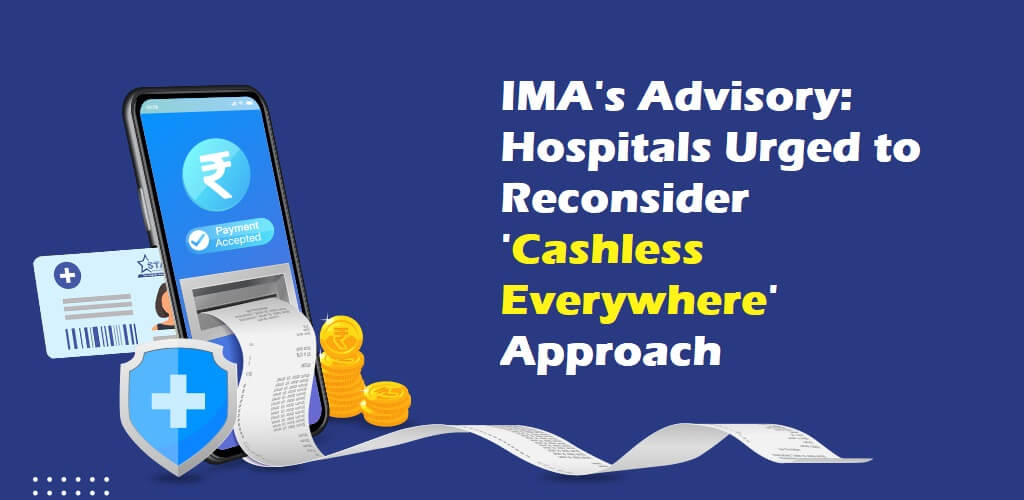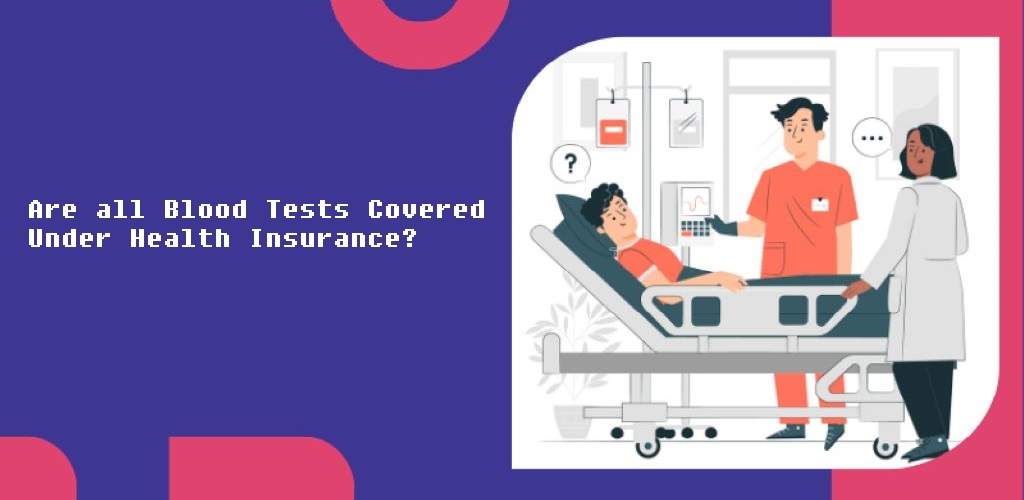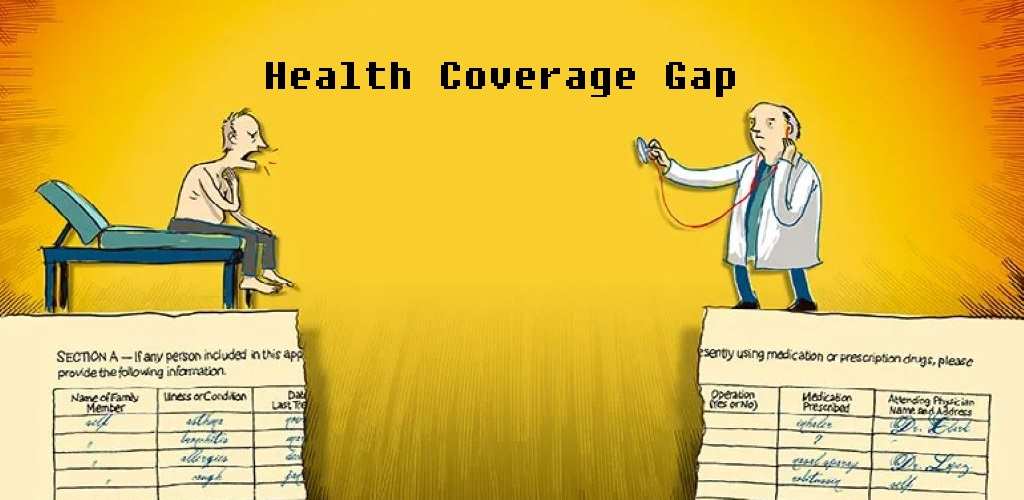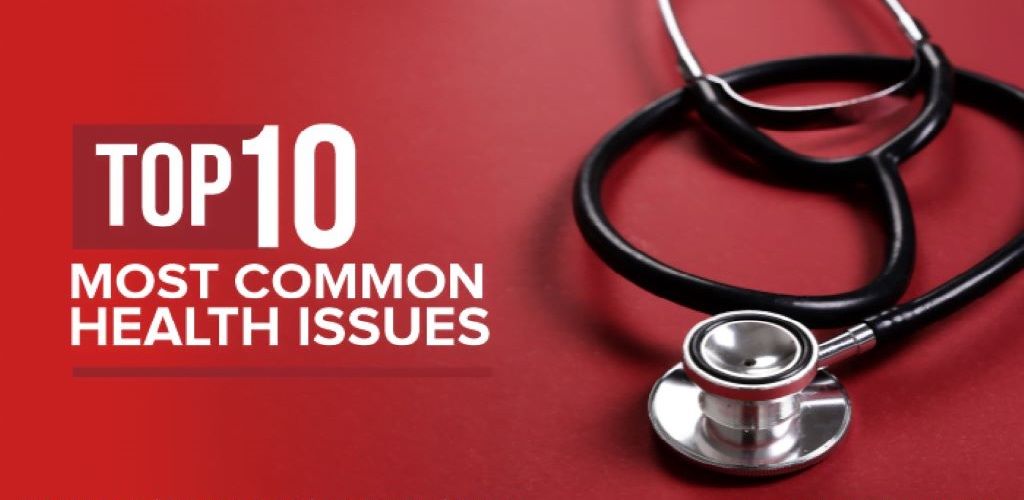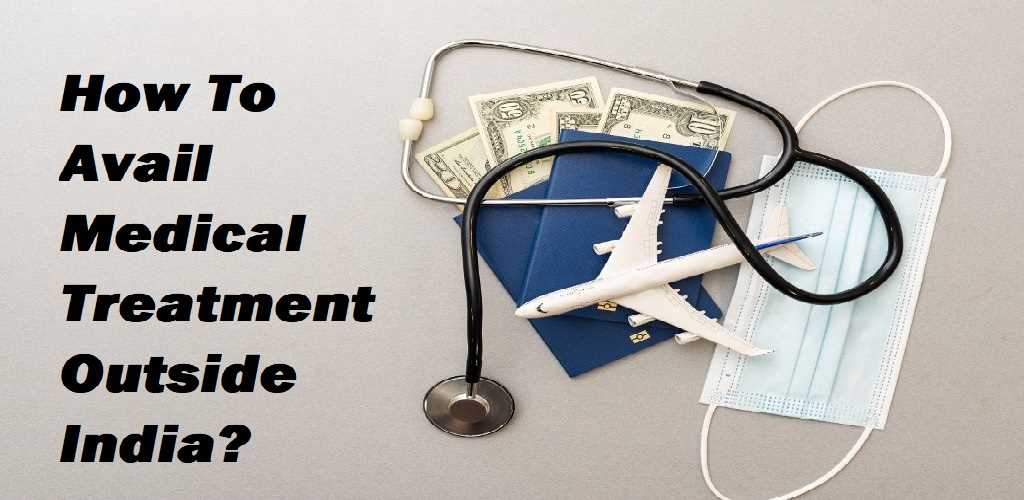India’s General Insurance Council (GIC) recently launched the ‘Cashless Everywhere’ initiatives to extend cashless treatment accessibility to policyholders, including non-empanelled hospitals. However, the Indian Medical Association (IMA) has issued a crucial advisory urging hospitals to reconsider the widespread adoption of this approach.
As doctors and healthcare professionals adapt to the evolving healthcare system landscape, the IMA’s advice is important and sparks discussions on how these changes might affect healthcare. In this article, we delve into the details of IMA’s advisory, examining the considerations and concerns that prompt the call for a reassessment of this newbie approach.
What Is A ‘Cashless Everywhere’ Plan?
As per Mr. Tapan Singhal (MD and CEO of Bajaj Allianz General Insurance; Chairman of the General Insurance Council), ‘only 63% of customers choose cashless claims, and others apply for reimbursement, causing financial stress and a lengthy process’. During hospitalization, policyholders can access cashless treatment, where insurance companies cover the costs directly if the claim is valid.
However, this option is limited to some hospitals. If policyholders opt for a hospital without such an agreement, they must pay upfront and then seek reimbursement, which delays the claims process. Therefore, the GIC developed the ‘Cashless Everywhere’ approach in collaboration with all the General and Health Insurance companies. Under the initiative, the policyholders can get treated in any hospital, regardless of whether it’s in the insurance company’s network.
However, there are some specific conditions that apply:
- For scheduled procedures, notify the insurance company 48 hours before admission.
- In case of emergencies, inform the insurance company within 48 hours of admission.
- The claim must comply with policy terms, and the cashless facility should follow the operating guidelines of the insurance company.
The Dilemma & Fears Of Hospitals
Even after it’s been more than a week since the launch of the scheme, there is a delay in its proper implementation. This is primarily because hospitals are saying that they are uncertain about the rates they can charge and patients are confused about how quickly they can get reimbursement from the insurance company. Hospitals are also raising an important issue that the rates fixed by the insurers are not according to the current inflation rates.
During a panel discussion, members of the Association of Medical Consultants (AMC) expressed concerns about the ‘Cashless Everywhere’ initiative, calling for clearer implementation details from the GIC. Moreover, independent nursing home operators, which are managing facilities with 10-25 beds and associated with AMC, are uncertain about forming tie-ups with insurance providers. They lack clarity on the package rates involved and whether tie-ups with each insurance provider are necessary or not.
Worries have also been expressed about the turnaround time of the claim process because delayed reimbursements from insurance providers might affect the operations of smaller nursing homes. Dr. Sudhir Naik of AMC has highlighted concerns about extending cashless services, especially if the insurance provider refuses to pay the full amount, leaving questions about covering the remaining bill.
What Are Activists & Other People Saying?
The ongoing debate between hospitals and activists revolves around the proposed rates by insurers and the transparency of hospital charges. Hospitals claim that the rates suggested by insurers do not align with current inflation rates, raising concerns about the financial viability of the proposed reimbursement. On the other hand, activists argue that hospitals often engage in overcharging patients, creating a scenario where patients may have to pay higher costs than necessary.
This may be evident from a case in 2023, where an insurance firm in Ahmedabad failed to decide on the limits of medical expenses. A 61-year-old male has to go through cataract surgery for both of his eyes and spent Rs. 1.64 lakhs on the treatment. The patient, however, claimed that his insurance company partially approved his claim and only paid Rs. 49,000. When asked for the reason, the insurer said that ‘the expense of the cataract surgery wasn’t customary and reasonable’. The consumer forum of Vadodara also stated that the insurance company was not able to determine which expense was not important for the treatment and what was the maximum amount of it.
Dr. Abhijit Atre (who works with Jan Arogya Abhiyaan) also claimed that ‘despite his involvement, suggestions for more transparency were not made a part of the law’. His disappointment shows a bigger problem with the amendments in the Clinical Establishment Act. Such debates, tussles, and disappointments underscore the ongoing struggle to have a fair and transparent healthcare system in India.
Issues With ‘Cashless Everywhere’ As Stated By IMA
There are many issues with the ‘Cashless Everywhere’ approach according to IMA.
- The initiative was launched without addressing the concerns raised by IMA HBI (Indian Medical Association – Hospital Board of India).
- The procedural aspects remain confusing, creating uncertainty in the implementation.
- While any policyholder can seek treatment in a hospital according to IRDAI guidelines, the existence of a one-time temporary MOU/Letter of Consent between insurance companies and hospitals lacks clear explanations with reference to packages mentioned in CMD Circular 066 (2023-24)
- There are also concerns regarding the mandatory inclusion of packages, contrary to various court orders.
- The insistence on packages, freebies, and discounts by the insurance companies and third-party administrators is criticized as illegal and non-scientific. They are compromising the quality of insurance products and being unjust to patients.
Important Advisory From IMA BHI
Here are the advisories released by IMA to warn the hospitals not to adopt the ‘Cashless Everywhere’ approach:
Threat To Hospital’s Sustainability:
The implementation of the approach in the healthcare system can be potentially threatening to the sustainability of hospitals. The initiative, in its current form, raises red flags and stirs a sense of urgency.
Hinders Patient Accessibility:
It may limit the rights of policyholders with higher sum-assured amounts from accessing advanced treatments. This, in turn, will hinder the patient’s accessibility to quality medical care when needed.
Refuse Product Packages:
IMA HBI strongly advises its members to refuse product packages and instead receive payments for actual expenses incurred. By doing so, hospitals can ensure that they are appropriately compensated for the services they offer.
Reject Freebies & Discounts:
IMA also advises its members to go against freebies and discounts or other incentives. This is highly important for offering quality healthcare services to patients.
Prioritize Cashless Transactions On Actual Expenses:
The association suggests focusing more on cashless transactions based on actual expenses incurred by patients. This is to ensure transparency and fairness in the entire healthcare ecosystem.
Wise Use Of Eligibility & Co-Payment:
It suggests that insurance companies should determine their eligibility criteria based on the sum insured. Any excess beyond the coverage provided by the policy should be subject to a co-payment by the policyholders, aligning the financial responsibility between patients and insurance providers.
Stick To Minimum Sustainable Charges:
The association encourages its members to adhere to the minimum suitable charges that are outlined in the annexure. As these charges are carefully calculated based on government standards, they assure hospitals to maintain their financial viability while offering quality care.
Beware Of ICs & TPAs:
Hospitals and other medical institutions need to exercise caution while considering unviable packages offered by Insurance Companies (ICs) or Third-party Administrators (TPA) as they may pose financial risks to the organizations.
Consider Consequences:
IMA HBI also says that in case the hospital/medical institution wishes to accept and adopt the ‘Cashless Everywhere’ initiative, they have to beat the potential risks on their own. Therefore, it is advisable to carefully consider the consequences before fully embracing the system.
Conclusion
With such cautionary messages, the Indian Medical Association (IMA) takes a noble stand to protect the sustainability and quality of healthcare. Recognizing the paramount importance of delivering excellent healthcare, the IMA HBI bravely addresses potential challenges within the current ‘Cashless Everywhere’ system.
The association emerges as a strong advocate for hospitals and the ongoing delivery of top-notch healthcare to patients. In this unified effort, the IMA urges its members to unite for a robust, patient-centered healthcare environment committed to unwavering excellence.

